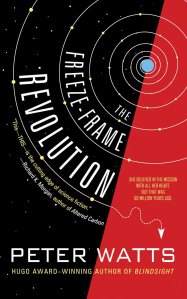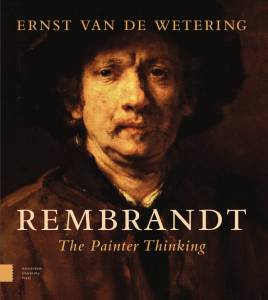After I finished the fantastic Version Control, I read the excellent Keith Rowe biography by Brian Olewnick. I might still review that, but it’s a hard review to write for an audience unfamiliar with Rowe’s particular branch of experimental music.
Sadly, after those 2 great books, I’ve hit three I did not even finish. That and the relentless summer heat didn’t really urge me to start writing the reviews. Fortunately, that streak of bad reading luck came to an end, as I’ve also read a great, recent SF novella by Peter Watts, and finished yet another book on Rembrandt.
As the summer drought is still not over, I’ve decided I simply won’t bother trying to write longer, in-depth reviews for these books. I won’t even try to write up Hard To Be A God, the 1964 political allegory by the Strugatsky brothers, and the first book in that row of DNFs. I stopped after only 40 pages, not enough to write something meaningful, except that it was all too obviously allegorical for my tastes. Anyhow, without further ado, here’s those 4 mini-reviews…
THE WINDUP GIRL – Paolo Bacigalupi (2009)
I abandoned this Hugo, Campbell, Nebula and Locus First Novel winner after 150 pages. It felt bloated, the story unfocused, and the world-building too obvious in its dependence on a few ideas (joules, genes). To me this kind of SF already feels dated. I might have liked this more at the beginnings of my forays into the genre.
A very McDonaldian formula by the way: take an exotic setting (Thailand) + add a few dystopian extrapolations (no more oil, genetic warfare).
My main issue was the writing though: slogging, both in prose as in getting the story started. A shame, as I liked Bacigalupi’s next book, The Water Knife: it’s a lot less pompous.
CALDÉ OF THE LONG SUN – Gene Wolfe (1995)
Abandoned about 60 pages before the ending. I liked the previous 2 books in this series, but this one dragged, and ultimately I couldn’t connect with the characters anymore. These books are hard work – both their prose as Wolfe’s tendency to be opaque about the story – and I didn’t feel like investing the effort anymore.
Add to that the fact that the overall story has become clear by this point in the series – it’s rather underwhelming compared to New Sun – and that killed the urge to explore this book and the final installment any further.
I’m hoping Wolfe’s Soldier series and Wizard Knight series will connect with me, as The Book of the New Sun is one of my favorite literary experiences ever.
THE FREEZE-FRAME REVOLUTION – Peter Watts (2018)

Great concept, snappy writing. A rather fresh take on the starship-and-its-humans-controlled-by-an-oppressive-AI. Plus a bit of mystery and suspense. Here’s a longer review by Jeroen Admiraal – it does a good job explaining the story’s setup.
Among other things, a nice metaphor about the non-existence of free will.
The only thing that did not fully work was the codes the conspirators used to communicate: too much handwavium there. Overall this has a hard SF vibe.
Based on this, I will check out Blindsight – something I have put off for too long. The Freeze-Frame Revolution is one of my favorite reads so far this year, and it’s only 192 pages.
REMBRANDT: THE PAINTER THINKING – Ernst van de Wetering (2016)

The bulk of this book is about Rembrandt’s relation to two 17th century Dutch texts on the theory of painting (by Karel Van Mander and Samuel Van Hoogstraten) with a lot of (translated) quotes from both sources. It shows Rembrandt to be methodological – not the mad genius some might think he was.
The heavy use of quotes makes the book a bit of a slog to read, and Van de Wetering makes his points again and again and again, while his overall ideas are pretty much clear very early on. (On a side note – the font the quotes are set in is terrible, making the lengthy passages hard to read.)
It’s an important book for any serious, professional Rembrandt scholar, but in a way it is redundant for the general public because of the 2017 publication of the affordable edition of Rembrandt’s Paintings Revisited – A Complete Survey: A Reprint of A Corpus of Rembrandt Paintings VI by the same author. For about 65 euros that delivers a truly spectacular feast: every known Rembrandt painting in a good, full page reproduction, with scholarly texts on almost each painting – some only a paragraph long, some spanning multiple pages. If you have read that, there is not that much too learn from this book, except for details.
Consult the author index for my other reviews, or my favorite lists.
Click here for an index of my non-fiction or art book reviews only, and here for an index of my longer fiction reviews of a more scholarly & philosophical nature.





Thanks for the link! About Gene Wolfe, I’ve read a lot of his books, always trying to re-experience the book of the new sun, but that series in the end is the only Gene Wolfe work that ever connected with me.
LikeLiked by 1 person
I liked Urth Of The New Sun too, but it’s indeed not as good as the original thing.
LikeLike
To say that I enjoyed The Windup Girl would be inaccurate 😉 But I quite appreciated it back in the day, despite its baroque overabundancy and a distasteful (for me) penchant for casual cruelty. The Water Knife is a decidedly better written novel, but still The Windup Girl isn’t without merit, with a bunch of ideas that were fresh then, and an ambition to show a harsh, uncaring world. However, it was long indeed, and I’m not sure I’d read it in full these days 😉 Still, I don’t regret reading it 😛
P.S. I believe we have reviews for both of these books on the blog.
LikeLiked by 2 people
Will check out those reviews. That first cruel scene seemed over the top indeed, and unbelievable at that, the entire concept of a GMO prostitute to torture seems to come from the same cloth as snuff movies, seemingly ‘cool’ for a story, but a bit juvenile, so to say.
LikeLiked by 1 person
Exactly! I really hated this scene and felt it was totally gratuitous – not even ‘cool’, more along the lines of ‘I’ll do it because I can’.
LikeLiked by 1 person
Ha, it’s funny, because I went into the novel expecting the title figure to be some kind of mechanical spring winded robot, but when I dropped out of it, I thought she was a genetically engineered biological human. I’ve just read your review, and it does turn out to be an android. Makes it even more unbelievable, given the world’s energy tech.
LikeLiked by 1 person
Yeah, I think Bacigalupi lent too heavily on the ‘tabula rasa’ philosophical concept coupled with the idea of a flawed creator – the premise was quite good, but then he really spoiled it 😉
LikeLiked by 1 person
I agree with Ola here, I did not exactly like it, it had its merits, it’s definitely worse than The Water Knife – but, remember, Water Knife was published 6 years after The Windup Girl. It’s definitely recommended to read them in order of publication, Bacigalupi is clearly polishing his skills 🙂
LikeLiked by 1 person
It’s a bit frustrating I can’t really know for sure if I had liked back in 2009, as I have a hunch it’s not only his skill as a writer that’s a factor, but also that this kind of approach easily dates. Can’t really put my finger on it, maybe because the last 9 years so much has happened politically and technologically.
LikeLiked by 1 person
Come on, you know you have to do the right thing and bring the Rowe evangelion to the masses. (I’ve really been looking forward to that review, since I’ve grown disenchanted with most music writing and I’m curious how the book fares.)
LikeLiked by 1 person
Haha! I’ll probably get to it at the end of the week, but that’s not a promise. I do want to write it, it’s just I wanna do it right. I doubt I’ll make a lot of converts here though.
LikeLike
Done!
LikeLiked by 1 person
Hmmm, *crossing The Windup Girl off my TBR list* good to know that this hasn’t dated so well. I’m still interested to read The Water Knife though.
Sorry to hear you had such a bad run of books – it’s so frustrating when that happens. Here’s to a happier reading future! 🙂
LikeLiked by 1 person
Water Knife was excellent, but it seems to have set my expectations too high. I’d read some other reviews of TWG before you cross it off your list though, it might have become better after I stopped.
LikeLiked by 1 person
In the interest of fairness I will read around a bit, but I trust your opinion. 🙂
LikeLiked by 1 person
I just finished reading back through your blog, Blindsight is both similar and different in a lot of ways to FFR, so I’m interested in what your thoughts about it might be.
LikeLiked by 1 person
I just posted my review!
LikeLike
Pingback: 2018 FAVORITES | Weighing a pig doesn't fatten it.
Pingback: Weighing a pig doesn't fatten it.
Would you describe the Watts novel as a generation ship story? I, of course, have a vast list on the topic and someone indicated that it might fit.
LikeLiked by 1 person
My initial reaction to your question was ‘yes it is’, but then I reread Jeroen’s review and more of the content came back to my mind and I’d say it is not.
The crew is in a very very long cyro and some are awakened for a few hours or days after thoundands of years according to the needs of the ship, but as far as I can remember there is no human reproduction on board, so no generations. Theoretically it would be possible however, and because of the long timespan the story has a bit of a generation ship vibe, but ultimately it is just a cyro ship story about the tension between the crew and the ship’s AI, and between the crew itself. Very original take on the matter, and highly recommended. A timeless classic imo.
LikeLike